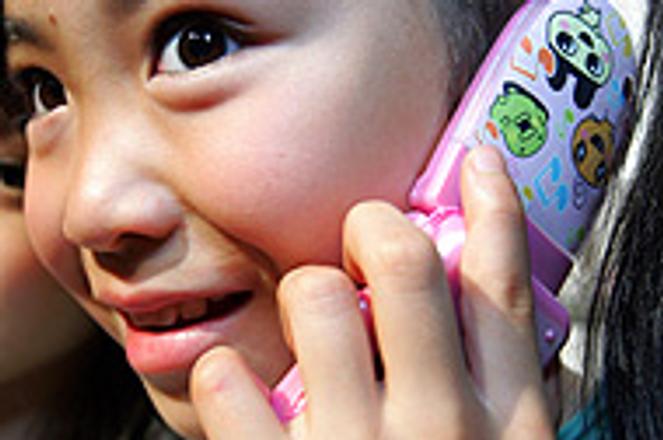A new guide helps parents and teachers keep children better informed about the risks of communicaton technologies.
photo: Reuters
SLOVAK children receive their first cell phone when they turn ten, according to a recent survey. Even though the children mostly use their phones to talk to their parents, siblings, friends, classmates or relatives, 43 percent also communicate with people whom their parents do not know. The children themselves often do not know these people personally, according to a survey about the dangers of mobile use among children carried out by the TNS AISA agency. While 42 percent of the 227 surveyed children chat with people on their phones or the internet, only 18 percent would tell their parents if someone they have contacted this way wants to meet them.
The 1,039 parents interviewed last fall felt that the online chats, phone calls and text messages that their children participate in could be very risky.
A guide entitled "Mobile Telephones and Electronic Communications: What Parents Should Know", prepared in cooperation with a psychologist, came as a response to the facts revealed by the survey.
The guide, published by one of Slovakia's mobile operators in April, is intended to help parents and teachers better inform children about safe usage of these communications technologies.
The guide is divided into chapters that deal with the main dangers that children face while using mobiles and also gives parents advice on how to eliminate the risks. The chapters cover topics such as the internet and unsuitable content, chat rooms and discussion forums, blogs, localisation services, intimidation and harassment with mobiles, the misuse of mobiles (making fake emergency calls) and so on.
According to child psychologist Mária Tóthová-Šimčáková, it is very important that the parents teach their children how to use their mobiles responsibly and also gain their children's trust so that they stay informed about what their children are doing.
Most Slovak children get their first mobile around their tenth birthday.
photo: TASR
"When parents give their children a mobile, they should talk to them about whom they can call and how much money they can spend and explain to them which of the mobiles functions they are allowed to use and which they should not," Tóthová-Šimčáková told The Slovak Spectator.
Nine out of ten children get the mobile as a present, especially from parents, who also pay the children's phone bills. As much as 44 percent of the children have a say in what kind of phone they want, the survey said.
According to the survey, almost half of the interviewed children admitted that they have used their mobile in classes.
They send each other test results, use their mobile as a calculator and, with the help of a hands-free set, talk to each other during tests.
Schools should set rules for the use of mobiles, said Tóthová-Šimčáková.
"If the school requires that children switch off their mobiles and put them in their bags during classes, the teachers should do the same and do not bring their mobiles to the classroom," she said. "They can then demand respect for the rules from the children."
However, Tóthová-Šimčáková does not think that a complete ban of the use of mobiles in schools would be a solution. The ban would make the use of mobiles in school even more attractive among children, she said.
Only 28 percent of children have had to make an emergency call, the survey found. However, many of them called it out of curiosity, said Tóthová-Šimčáková.
"When their parents tell them about emergency numbers so that they can call an ambulance or the police if they need to, the children want to try it even though they have no reason for it," she said.
Vulgar text messages and websites with inappropriate content also pose a problem, said Michal Višinský from the TNS AISA agency, since 33 percent of children admitted that they have received vulgar text messages and approximately half of the interviewed children have already visited a website with inappropriate content.
Tóthová-Šimčáková also advises parents to explain to their children what to do if they receive an indecent picture or vulgar text message, or when someone is harassing them or bullying them over the phone.
"They should firstly contact their parents because they can give them advice and help them resolve the situation," said Tóthová-Šimčáková.
However, the survey also revealed a certain lack of trust within families as 48 percent of children said they would not tell their parents if they received a text message with vulgar words while 33 percent would not even admit a threatening or intimidating phone call.
Vyšinský said that only now are parents beginning to realize the existence of these risks.
Orange, the mobile operator that published the guide, said that it wanted to demonstrate more responsibility towards its clients.
"We are aware that mobiles are not used only by adults but also by children who are a very sensitive group of mobile users," Orange spokesman Richard Fides told The Slovak Spectator.
The guide has been distributed to all regional pedagogic and psychological departments, regional school authorities and elementary schools. The guide will also be available for parents.
"We have heard from the police that in some regions they use the guide during workshops for elementary school children where they talk to them about the dangers connected to the use of mobile phones," Fides said.


